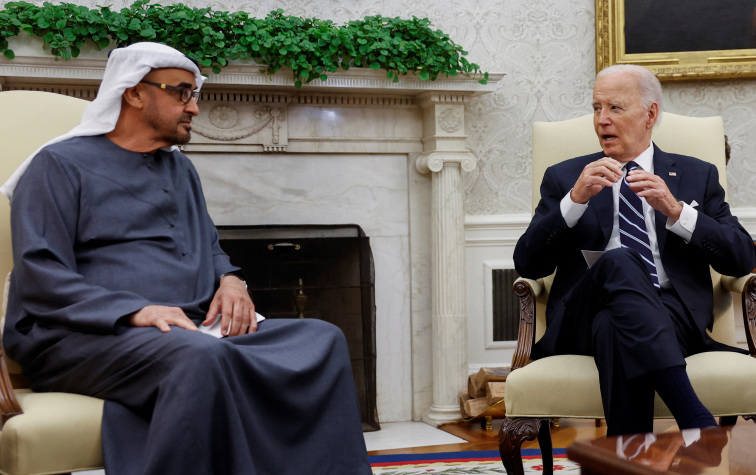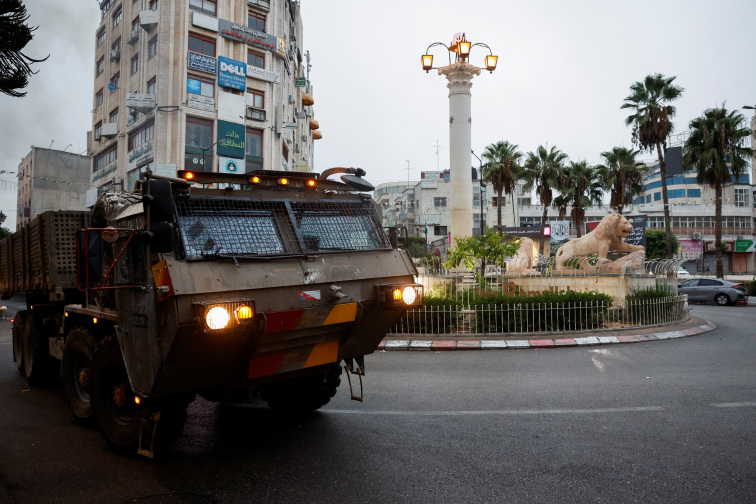Members of the civil defence and firefighting unit work at the site of an Israeli strike in Beirut's southern suburbs, Lebanon September 24, 2024. (REUTERS/Mohamed Azakir)
BEIRUT/JERUSALEM (Reuters) -An Israeli airstrike on the southern suburbs of Beirut on Tuesday killed a Hezbollah commander who was a leading figure in its rocket division, two security sources in Lebanon said, as fears of a full-fledged war in the Middle East mounted.
The sources identified the commander who was killed as Ibrahim Qubaisi. The attack, in which six people were killed, dealt another blow to the Iran-backed group which has faced a series of setbacks at the hands of Israel over the past week.
The pressure on Hezbollah has increased fears that nearly a year of conflict will explode and destabilise the oil-producing Middle East, where a conflict between Hamas and Israel is already raging in Gaza with no end in sight.
Israel struck the Hezbollah-controlled area of the Lebanese capital for a second consecutive day after mounting a new wave of airstrikes on targets in Lebanon. Hezbollah said it had fired rockets into northern Israel earlier on Tuesday.
After nearly 12 months of war against the Palestinian militant group Hamas in Gaza on its southern border, Israel is shifting its focus to the northern frontier, where Hezbollah has been firing rockets into Israel in support of Hamas, which is also backed by Iran.
The Lebanese health ministry gave an initial toll of six dead and 15 wounded in the Beirut strike, which hit a building in the usually busy Ghobeiry neighbourhood. One of the security sources shared a photo showing damage to the top floor of the five-storey building.
The Israeli military carried out airstrikes against Hezbollah on Monday which Lebanese authorities said killed more than 500 people in the country's deadliest day in decades.
The Israeli government has made securing the northern border and returning residents there a war priority, setting the stage for a long conflict, while Hezbollah has vowed that it will not back down until a ceasefire is reached in Gaza.
"The situation requires continued, intense action in all arenas," Military Chief of General Staff Herzi Halevi said after holding a security assessment, vowing to keep up pressure on Hezbollah.
Lebanese authorities said 558 people had been killed, including 50 children and 94 women, in Israel's airstrikes on Monday. A further 1,835 were wounded, they said, and tens of thousands more have fled for safety.
The casualty tolls and the intensity of the attacks by the most powerful and advanced military in the Middle East have spread panic in Lebanon, which suffered from devastating destruction when Israel and Hezbollah fought in 2006.
"We are waiting for victory, God willing, because as long as we have a neighbour like Israel, we can’t sleep safely," said Beirut resident Hassan Omar.
Afif Ibrahim, a taxi driver from southern Lebanon, said: "They (Israel) want us (Lebanese) to kneel, but we kneel only to God in our prayers; we bow our heads to no one but God."
CALLS FOR DIPLOMACY
Calls for diplomacy are growing as the conflict worsens, with UN human rights chief Volker Turk urging all states and actors with influence to avert further escalation in Lebanon.
White House national security adviser Jake Sullivan told MSNBC that he believed "a path forward" could still be found to de-escalation and a diplomatic solution.
British Prime Minister Keir Starmer urged restraint and sought de-escalation on the border between Lebanon and Israel, telling his governing Labour party: "I call again for all parties to step back from the brink."
The fighting has raised fears that the United States, Israel's close ally, and regional power Iran, which has proxies across the Middle East - Hezbollah, Yemen's Houthis and armed groups in Iraq - will be sucked into a wider war.
Hezbollah last week suffered heavy losses when thousands of pagers and walkie-talkies used by its members exploded in the worst security breach in its history.
The operation was widely attributed to Israel, which has a long history of sophisticated attacks on foreign soil. It has not confirmed or denied responsibility.
Israel's intelligence and technological prowess has given it a strong edge in both Lebanon and Gaza. It has tracked down and assassinated top Hezbollah commanders and Hamas leaders.
But Hezbollah has proved resilient during decades of hostilities with Israel. The group, founded by Iran's Revolutionary Guards in 1982 to counter an Israeli invasion of Lebanon, is a more formidable enemy than Hamas.
Hezbollah used a new rocket, Fadi 3, in an attack on an Israeli army base, the group announced in a message posted on Telegram on Tuesday.
Its media office Israel was dropping leaflets with a "very dangerous" barcode on them onto Lebanon's eastern Bekaa Valley, warning that scanning it by phone would "withdraw all information" from any device.
There was no immediate comment from the Israeli military. Hezbollah's media office did not say if anything else was written on the flyers.
Pan-Arab television station Al-Mayadeen said a journalist working with the station's website, Hadi al-Sayyed, had been killed in an Israeli strike on his hometown on Monday.
It brings the toll of journalists killed in Lebanon since October to four, including two other Al-Mayadeen journalists killed last November and Reuters visuals journalist Issam Abdallah, who was killed by Israeli tank fire last October.
(Reporting by Maya Gebeily and Tom Perry in Beirut and Clauda Tanios and Nadine Awadallah in Dubai and Miro Maman and Ronen Zvulun in Haifa and Dmitry Antonov in Moscow and Sachin Ravikumar in London and Alistair Smout and Andrew MacAskill in Liverpool; writing by Michael Georgy; Editing by Angus MacSwan, Sharon Singleton and Timothy Heritage)










News magazine bootstrap themes!
I like this themes, fast loading and look profesional
Thank you Carlos!
You're welcome!
Please support me with give positive rating!
Yes Sure!